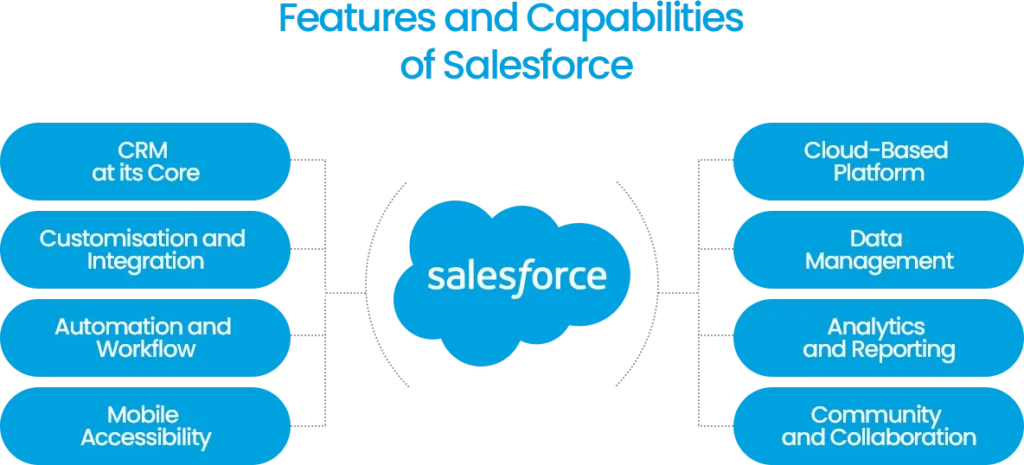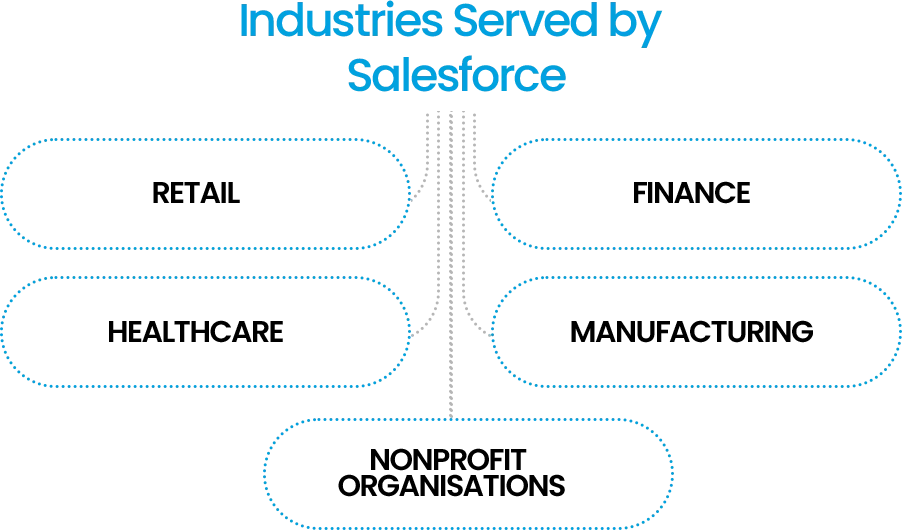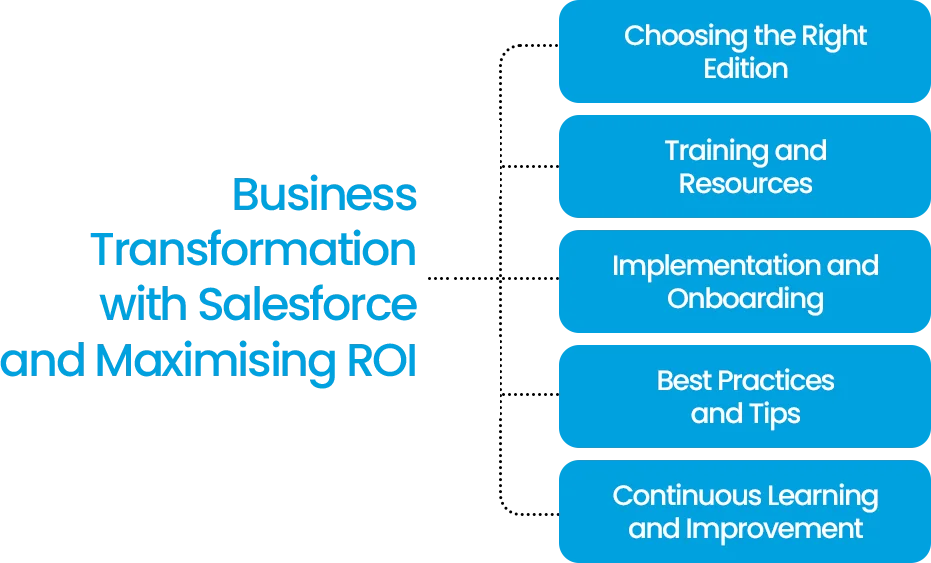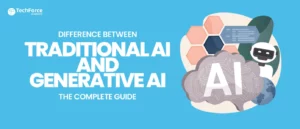Salesforce, a digital revolution pioneer, has transformed how businesses interact with customers, workers, and partners. Founded in 1999 as a cloud-based CRM platform, it has since grown to become a global leader in customer relationship management services.
This blog digs into Salesforce’s history, products, features, and transformational influence on organisations around the world, emphasising its capacity to adapt and understand changing client demands.
What is Salesforce?
Salesforce is not just a software company; it’s a trailblazer in reshaping the way businesses connect with their customers, employees, partners, and products.
Salesforce, a cloud-based platform, is used as a comprehensive customer relationship management (CRM) platform, allowing businesses to manage sales, marketing, customer support, and other services from a single location, ultimately improving customer relationships, simplifying processes, and driving growth.
Salesforce has grown its products to encompass a diverse set of corporate applications centred on customer care, marketing automation, and artificial intelligence.
But Salesforce is more than just a CRM tool; it’s a comprehensive ecosystem designed to streamline business processes, foster collaboration, and drive growth.
Salesforce's Origins and Evolution
Salesforce’s adventure began in 1999 when Marc Benioff and Parker Harris established the company in the software sector with cloud-based solutions. Salesforce began as a CRM platform and developed fast due to its groundbreaking approach to managing customer interactions.
Over the years, the company has extended its offerings, delivering a variety of goods and services to meet the changing demands of businesses globally. Today, with millions of users and a global presence, Salesforce continues to impact the future of business with its dedication to innovation, client success, and social responsibility.
What Does Salesforce Offer and How Does It Work?
Salesforce provides a powerful customer relationship management (CRM) system that serves as the foundation for a wide range of goods and services. These products include tools for sales, marketing, customer support, analytics, and more, all of which are seamlessly linked into a single ecosystem.
Salesforce works by centralising data and procedures, giving users a 360-degree view of their customers while simplifying operations across divisions.
Salesforce’s simple interface, customisable features, and powerful automation capabilities empower businesses to boost productivity, inspire collaboration, and provide exceptional experiences across all touchpoints.
Salesforce provides scalable solutions geared to your specific needs, allowing you to easily uncover new possibilities and meet your company objectives.
Why is Salesforce a Game-Changer?
Salesforce’s groundbreaking approach and interaction with consumers distinguish it in the digital sector. Salesforce helps enterprises to break free from old silos and adopt a unified approach to process management by delivering a cloud-based platform with a diverse set of apps and services.
This not only simplifies the system but also encourages cooperation and creativity across teams. Furthermore, Salesforce’s commitment to continuous innovation and growth ensures that enterprises stay ahead in a rapidly evolving sector.
Features and Capabilities of Salesforce

1. CRM at its Core
Salesforce has changed customer relationship management (CRM) into a comprehensive system focused on client interactions, enabling your organisations to develop deeper connections and drive growth.
2. Cloud-Based Platform
Salesforce cloud-based solutions give your businesses the flexibility, scalability, and convenience of working in the cloud, allowing you to access data and resources from anywhere, at any time.
3. Customisation and Integration
Salesforce offers extensive customisation possibilities, allowing your organisations to personalise the platform to your exact requirements while seamlessly integrating it with existing systems and processes for increased efficiency and productivity.
4. Data Management
Salesforce offers extensive capabilities to organise, store and optimise, enabling you to gain valuable insights and make strategic decisions.
5. Automation and Workflow
By automating repetitive tasks and organising workflows, Salesforce allows your businesses to streamline processes, improve productivity, and focus on high-value activities, ultimately creating employment and growth.
6. Analytics and Reporting
With Salesforce’s advanced analytics and reporting capabilities, you can gain deeper insights into your operations, customer behaviour and market trends, empowering you to make data-driven decisions and optimise operations.
7. Mobile Accessibility
Salesforce’s mobile-friendly options ensure that you can stay connected and productive on the go, enabling access to critical information and functionality from smartphones and tablets, anytime, anywhere.
8. Community and Collaboration
Salesforce facilitates teamwork and communication within organisations through its community and collaboration features, fostering knowledge sharing, idea generation, and innovation among employees, partners, and customers.
Salesforce Ecosystem and Products
Salesforce’s ecosystem consists of a diverse set of goods and services designed to fulfil the demands of businesses across many sectors. Let’s look more closely at what Salesforce adds to the table:
>> Sales Cloud
Salesforce’s main product for managing sales teams.
>> Service Cloud
A customer support platform that provides multichannel help.
>> Marketing Cloud
Solution for marketing automation and analytics.
>> Commerce Cloud
Provides seamless shopping experiences across different platforms.
>> Community Cloud
An online platform for consumer and staff engagement.
>> Revenue Cloud
A set of tools for revenue management and optimisation.
>> Education Cloud
A solution for managing relationships within the education industry.
>> Einstein Analytics
Einstein Analytics provides AI-powered insights for data-driven choices.
>> Salesforce AppExchange
A marketplace for third-party applications and integrations.
>> Salesforce IoT
It allows businesses to connect and analyse data from Internet of Things devices.
>> Salesforce Industries
Industry-specific solutions for diverse businesses.
>> MuleSoft
MuleSoft creates application networks for seamless connectivity.
>> Tableau
Data visualisation and analysis platform for insights.
>> Salesforce Essentials
Simplified CRM for small businesses.
>> Quip
Collaboration platform for real-time teamwork.
>> Salesforce Marketing Cloud Intelligence (MCI)
Marketing analytics integrating online and offline data.
>> Trailhead
Salesforce’s free online e-learning platform for Salesforce skills.
>> Salesforce Customer 360 Platform
Integrated platform for customer-facing applications.
>> Salesforce Blockchain
Low-code platform for building blockchain networks.
>> Work.com
Suite of tools for pandemic-related challenges.
Industries Served by Salesforce

Salesforce is more than simply a business. It is a flexible platform that serves a wide range of industries, guaranteeing that its solutions assist organisations in all sectors.
1. Retail – Salesforce enables retailers to improve the customer experience, manage inventory, and increase sales through tailored marketing activities.
2. Finance – In the financial sector, Salesforce streamlines customer management, lead generation and compliance, empowering financial institutions to deliver exceptional service.
3. Healthcare – Salesforce empowers healthcare practitioners to improve patient care, streamline administrative chores, and communicate with patients more effectively.
4. Manufacturing – Salesforce enables firms to streamline supply chains, manage sales channels, and improve team communication to increase productivity.
5. Nonprofit organisations – Nonprofit organisations utilise Salesforce to manage donor connections, plan fundraising efforts, and comply with impact accountability in order to fulfil their objectives.
Business Transformation with Salesforce and Maximising ROI

1. Choosing the Right Edition
Salesforce is not a one-size-fits-all platform. Take the time to understand the distinctions between the various versions, from Essentials to Unlimited. Consider the size of your organisation, industry requirements, and the features you want. You may maximise the value of your investment by tailoring the edition to your specific requirements and goals.
2. Training and Resources
Salesforce has several options to help you improve the platform. Whether you are a new or veteran user, there is something for everyone. Dive into extensive tutorials, browse detailed documentation, and contact specialised support channels. With these resources, you can empower your team to understand Salesforce, which will result in organisational success.
3. Implementation and Onboarding
Establish clear objectives and deadlines to ensure a successful execution. Work with your Salesforce implementation partner, if you have one, to develop a bespoke solution that meets your needs. Onboarding necessitates effective communication. Provide significant training and assistance to all team members, address any concerns, and foster an adoption culture from the beginning.
4. Best Practices and Tips
As you start your Salesforce journey, keep the following best practices in mind. Instead of attempting to shoehorn your operations into Salesforce, tailor it to your unique business requirements. Workflows should be examined and updated on a regular basis to ensure maximum efficiency and effectiveness. Encourage user and stakeholder feedback so that your Salesforce instance may continuously expand and change over time.
5. Continuous Learning and Improvement
In the fast-paced world of technology, remaining static is not an option. Adopt a philosophy of constant learning and progress. Stay updated on the latest Salesforce changes, features, and best practices by following official channels, joining user communities, and attending events. Staying ahead of the curve allows you to future-proof your Salesforce approach and keep your firm competitive in an ever-changing digital market.
Conclusion
As we wrap up our analysis of Salesforce, it’s clear that its impact extends beyond standard CRM functions. Salesforce gives organisations the tools they need to successfully navigate the digital age with an extensive product ecosystem, configurable features, and commitment to innovation
As we look ahead, one thing is certain: Salesforce will lead changes that will transform how we do business, driving innovation and success.










